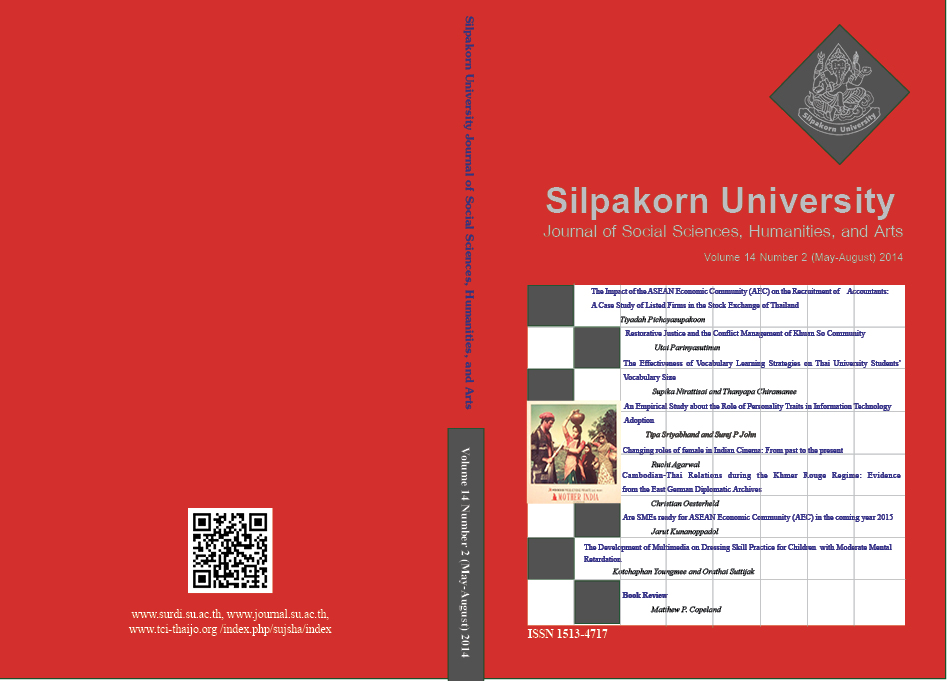The Contribution of Vocabulary Learning Strategies to University Students’ Vocabulary Size
Main Article Content
Abstract
The present study aimed to investigate the relationship between students’ vocabulary learning strategies and their vocabulary size. The frequency of vocabulary learning strategies used by the high and low vocabulary students was also explored. The subjects of this study were 257 Prince of Songkla University students in the 6 fields of study who wouldbe highly affected by the opening of ASEAN Economic Community (AEC) in 2015: medical, dental, nursing, engineering, accounting, and hospitality and tourism fields. The research instruments were the vocabulary learning strategy questionnaire, the bilingual English-Thai version of vocabulary size test, and a semi-structured interview. The results revealed that the subjects’ use of vocabulary learning strategies was moderately correlated with their vocabulary size. The subjects in the high vocabulary group employed certain strategies significantly more often than those in the low vocabulary group (p<.01). Determination strategies were the most frequentlyused strategies and social strategies were the least used strategies.
Downloads
Article Details
All rights reserved. Apart from citations for the purposes of research, private study, or criticism and review,no part of this publication may be reproduced, stored or transmitted in any other form without prior written permission by the publisher.
References
Catalan, R. (2003) Sex Differences in L2 Vocabulary Learning Strategies. Applied Linguistics, 13(1): 54-77.
Chen, M. C. (1998) The Role of Individual Difference in Adults Benefits from the Mnemonic Keyword Method for Foreign Vocabulary Learning. Unpublished Doctoral Dissertation, University of Southern Illinois at Carbonale, USA.
Crystal, D. (1997) English as a Global Language. Cambridge University Press: Cambridge.
Cunningsworth, A. (1995) Choosing your Course Book. Oxford: Heinemann.
Fan, M. Y. (2003) Frequency of Use, Perceived Usefulness, and Actual Usefulness of Second Language Vocabulary Strategies: A Study of Hong Kong Learners. The modern Language Journal, 87(2): 222-241.
Gardner, R. C. and Lambert, W. E. (1972) Attitude and Motivation in Second Language Learning. Massachusetts: Newbury House Publishers.
Gairns, R. and Redman, S. (1986) Working with Words. CUP.
Gu, P. Y. and Johnson, R. K. (1996) Vocabulary Learning Strategies and Language Learning Outcomes. Language Learning, 46(4): 643-679.
Haitema, T. B. (2002) Students Attitude vis A vis Foreign Language in the Elementary School (FLES): A Longitudinal Study. Unpublished Research, The University of North Carolina at Chapel Hill, USA.
Hamzah, M., Kafipour, R., and Abdullah, S.K. (2009) Vocabulary Learning Strategies of Iranian Undergraduate EFL Students and Its Relation to their Vocabulary Size. European Journal of Social Science, 11: 39-50.
Intaraprasert, C. (2004) ESE Students and Vocabulary Learning Strategies: A Preliminary Investigation. Unpublished Research, Suranaree University of Technology, Nakhon Ratchasima, Thailand.
Komol, T. and Sripetpun, W. (2011) Vocabulary Learning Strategies Employed by Undergraduate Students and Its Relationship to their Vocabulary Knowledge. Paper Presented at the 3rd International Conference on Humanities and Social Science, 1-18.
Lado, R. (1967) The Construction and Use of Foreign Language Tests. London: Longman.
Littlewood, W. (1983) Communicative Language Teaching: An Introduction. Cambridge: Cambridge University Press.
McCarthy, M. J. (1998) Vocabulary and Language Teaching. New York: Longman.
Nation, P. (1990) Teaching and Learning Vocabulary. New York: Heinle and Heinle.
Nation, P. (1993) Vocabulary size, growth and use. In The Bilingual Lexicon (R. Schreuder and B. Weltens eds.), pp. 115-134. Amsterdam/Philadelphia: John Benjamins.
Nation, P. (2001) Learning Vocabulary in Another Language. Cambridge: Cambridge University Press.
Nation, P. (2006) How Large a Vocabulary is Needed for Reading and Listening? Canadian Modern Language Review, 63(1): 59-82.
Nation, P. and Beglar, D. (2007) A Vocabulary Size Test. The Language Teacher, 31(7): 9-13.
Nirattisai, S. and Chiramanee, T. (2014) Vocabulary Size and Vocabulary Learning Strategies of Thai Universit Students. Unpublished Master Dissertation, Prince of Songkla University, Songkla, Thailand.
Oxford, R. (1990) Language Learning Strategies: What Every Teacher Should Know. Boston: Newbury House.
Oxford R. L. and Nyikos, M. (1989) Variables Affecting Choice of Language Learning Strategies by University Students. The Modern Language Journal, 73: 291-300.
Ranalli, J. (2003) The Treatment of Key Vocabulary Learning Strategies in Current ELT Coursebooks: Repetition, Resource Use, Recording. Unpublished Master Dissertation, University of Birmingham, UK.
Ratner, B. (2011) The Correlation Coefficient: Definition. Retrieved March 23, 2014, from https://www.dmstat1.com/ res/TheCorrelationCoefficientDefined.html.
Rattanavich, S. (2013) Comparison of Effects of Teaching English to Thai Undergraduate Teacher-Students through Cross-CurricularThematic Instruction Program Based on Multiple Intelligence Theory and Conventional Instruction. English Language Teaching, 6(9), 1-18.
Sarani, A. and Kafipour, R. (2008) The Study of Language Learning Strategies Use by Turkish and Kurdish EFL University Students. Language Forum, 34(2): 173-188.
Sawangwaroros, B. (1984) American and British English. Phasa Parithat Journal, 4(2): 24-37.
Schmitt, N. (1997) Vocabulary Learning Strategies. In Vocabulary: Description, Acquisition and Pedagogy (N. Schmitt and M. McCarthy, eds.), pp. 199-227. Cambridge: Cambridge University Press.
Siriwan, M. (2007) English Vocabulary Learning Strategies Employed by Rajabhat University Students. Unpublished Doctoral Dissertation, Suranaree University of Technology Nakhoratchasima, Thailand.
Sokmen, A. (1997) Current Trends in Teaching Second Language Vocabulary. In Vocabulary: Description, Acquisition, and Pedagogy (N. Schmitt and M. McCarthy, eds.), pp. 237-257. Cambridge: Cambridge University Press.
Sripetpun, W. (2000) The Influence of Vocabulary Size on Vocabulary Learning Strategies and Vocabulary Learning Strategies. Unpublished Doctoral Dissertation. Victoria: La Trobe University, Australia.
Sukkong, J. (2010) Learning Achievement, Retention, and Attitudes towards English Vocabulary Learning of Students Taught Games and Conventional Method. Unpublished Master Dissertation, Prince of Songkla University, Thailand.
Waldvogel, D. A. (2011) Vocabulary Learning Strategies among Adult Learners of Spanish as a Foreign Language. Unpublished Doctoral Dissertation, The University of Texas at Austin, USA.


